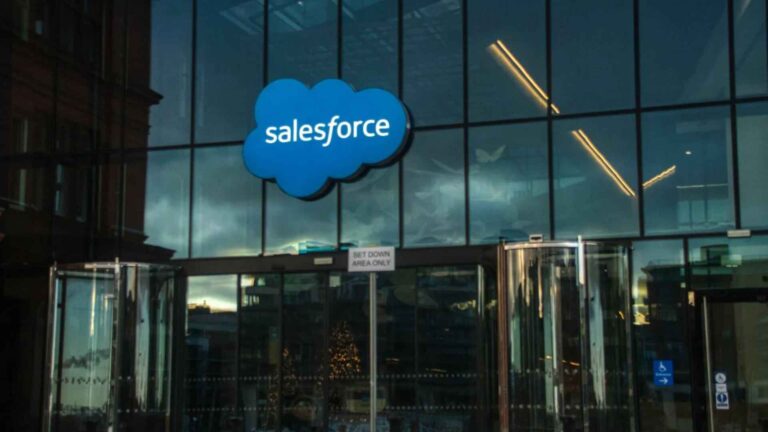By Techystribes News
In a headline-making move, Salesforce stock jumped sharply today after the company unveiled a bullish vision for its CRM business through 2030. The forecast — projecting over $60 billion in annual revenue by the 2030 fiscal year — reignited investor optimism and sent ripples throughout the enterprise software market.
As Wall Street reacts to the news, one question stands out: is this the start of a new growth era for CRM stock, or a high-stakes gamble in a volatile tech landscape?
Why Salesforce Is Reclaiming the Growth Narrative
Salesforce is repositioning itself at the heart of the global CRM and enterprise AI transformation.
A $60B Forecast That Beats Wall Street
According to company filings, Salesforce expects its fiscal 2030 revenue to exceed $60 billion, outpacing Wall Street’s earlier estimate of about $58.3 billion. The forecast doesn’t yet factor in revenue from its planned Informatica acquisition, suggesting additional upside potential.
In response, salesforce stock surged more than 4% in after-hours trading, with investors interpreting the move as a sign of regained confidence after a sluggish year for software equities.
AI Integration, Buybacks, and Strategic Moves
Behind the numbers lies a multifaceted strategy. Salesforce announced a $7 billion share buyback initiative — a bold show of strength that signals leadership’s confidence in the company’s future trajectory.
The firm is also doubling down on artificial intelligence, expanding collaborations with OpenAI and Anthropic, while scaling its new Agentforce 360 platform. The Informatica deal, meanwhile, is expected to reinforce Salesforce’s core data integration capabilities — essential for delivering next-gen, AI-powered CRM experiences.
Challenges and Skepticism Among Experts
While the 2030 forecast has energized markets, analysts warn that execution risks still loom large.
Execution Hurdles with AI Adoption
Experts point out that Salesforce’s AI ambitions, though vast, have yet to fully materialize in terms of measurable client adoption. A Barron’s report noted that despite its significant AI investment, salesforce stock has struggled to sustain consistent growth, with shares down roughly 29% year-to-date.
D.A. Davidson’s Gil Luria commented that “returning to double-digit growth won’t be easy — Salesforce must balance innovation with operational discipline.”
Macro Pressures and Competitive Risks
Salesforce also faces broader macroeconomic challenges. Enterprise clients are tightening budgets amid economic uncertainty, and CEO Marc Benioff himself recently acknowledged that AI innovation is outpacing customer adoption.
Moreover, competitors like Microsoft, ServiceNow, and Oracle are racing to capture the same enterprise AI space. As the CRM market becomes increasingly crowded, Salesforce’s ability to differentiate on data integration and user experience will be crucial.
What This Means for CRM Stock Investors
For CRM stock investors, Salesforce’s announcement is more than just a milestone — it could redefine expectations across the entire enterprise software sector.
Reassessing Valuations and Growth Hopes
With this new forecast, analysts are revisiting their valuation models. Investopedia recently noted that Salesforce’s key resistance levels sit near $270–$290, with support around $230, suggesting that the stock is now trading at a pivotal level for long-term trend confirmation.
If momentum holds and revenue execution remains strong, salesforce stock could lead a broader CRM market rebound.
Watching Traction, Metrics, and Execution
Moving forward, investors will focus on whether Salesforce can consistently deliver double-digit bookings, margin expansion, and tangible AI monetization. Every quarterly earnings report will serve as a critical checkpoint for Wall Street sentiment.
If these metrics align with the company’s 2030 vision, CRM stock across the board could see renewed investor enthusiasm — but a single misstep might shake confidence.
Closing Discussion
Today’s surge in salesforce stock represents more than just a short-term reaction — it marks a potential inflection point in the company’s growth story. The bold $60 billion target, coupled with aggressive AI expansion and shareholder-friendly buybacks, signals that Salesforce is betting heavily on reclaiming leadership in the CRM arena.
Still, challenges remain. Execution gaps, slow AI adoption, and macro uncertainty could all test Salesforce’s 2030 ambition.
If Salesforce delivers, it could redefine the next decade of enterprise software — but if not, this rally may be remembered as a bold promise that fell short.


